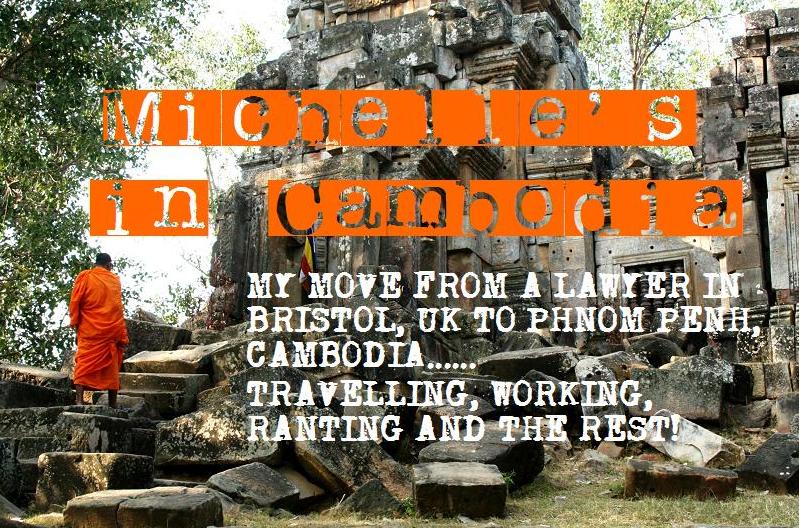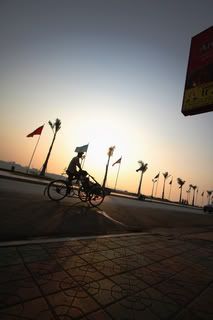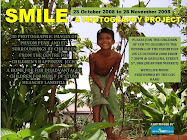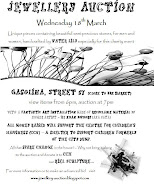After a busy couple of days in the city it was time to get some fresh air. Mondulkiri is in the wild east of Cambodia. An isolated place of waterfalls and jungle. I hadn't been there before and looked forward to exploring new territory.
Setting off from Phnom Penh at 6.30am, as the cyclos headed to market along the riverside, in a Cambodian private taxi was a real luxury - Only stopping once for a Caltex snack break (with the SUVs).... For some reason Cambodia hasn't put into practice the concept of a single bus stop in a village or town. A bus seems to stop in even the smallest of villages no less than about 5 or 6 times to pick up people/chicken/parcels etc who are standing less than 20 metres apart. A journey time of about 6 hours must have been record breaking (think 12 hour + for a bus journey).
As I made my way further and further into the wilderness the road turned into red dust and the scenery green. However, at some points the jungle near to the road had been reduced to nothing (more on this later...). Cambodia, it has been reported is the third worst country in the world in respect of illegal deforestation and Mondulkiri has been experiencing rapid deforestation in recent years from illegal logging and land grabbing - but that is a whole different story.... The province was still full of natural beauty with its mountains rich and green. One thing that never fails to impress is the Cambodian sky with its excellent clouds! The red dust swirling across the green of the countryside gives the trees by the roads a rusty look. Brown, green and blue.


I can recommend the Nature Lodge (an eco lodge) as a place to stay in Mondulkiri - or even as a place to stay in Cambodia. There isn't exactly a lot of competition in the provincial main town of Sen Monorom (I spotted about 2 whole other bars) but it does an excellent job in any event. The location is quite a walk out of town (get a moto!) but that is certainly part of the charm of the place.
Individual huts have private outdoor bathrooms with sweeping views and peace and quiet. The communal area was a perfect place to relax with an Ankgor beer and a good book! http://www.naturelodgecambodia.com/
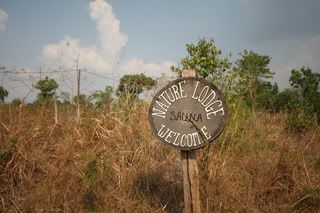



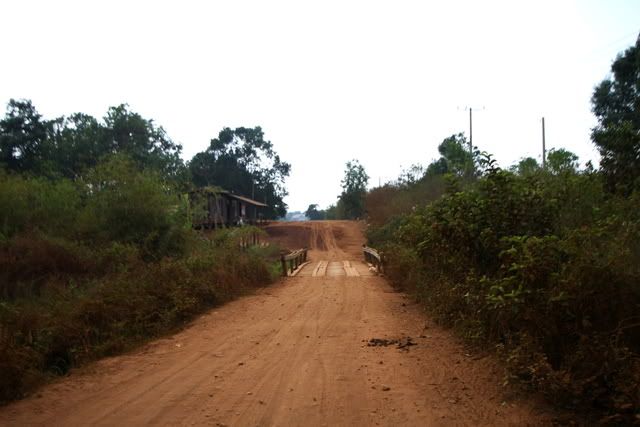
Itching to explore a walk into town seemed like a good option to take in the scenery (and the baking heat). The town was interesting. I had been to Ratanakiri (the neighbouring province) before) - the two places are described in travel books in a similar tone. The way in which you were immediately coated in red dust in both provinces was very similar but, apart from that, Sen Monorom seemed much quieter and much more isolated.
The high street was a red dust track and everything surrounding it was also covered in red dust. A market with standard Cambodian wares (with a wedding tent pitched right outside as normal...) was hidden away in a back street. That was about it.
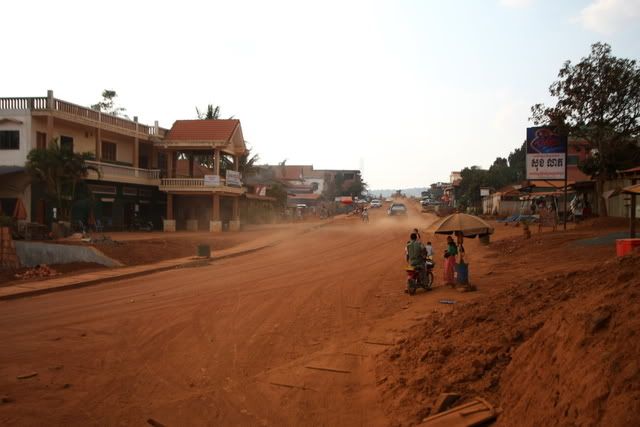
Happening high street (below and above)
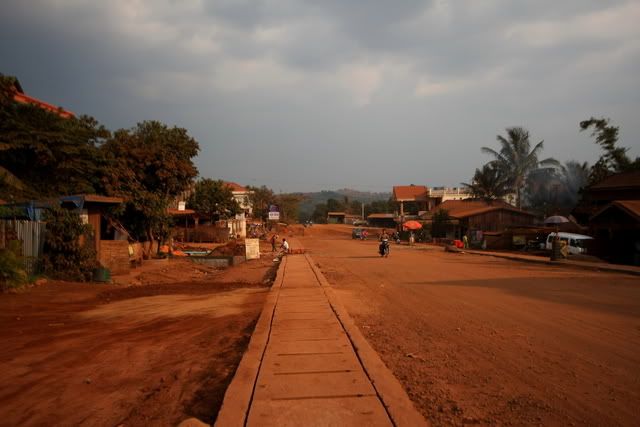
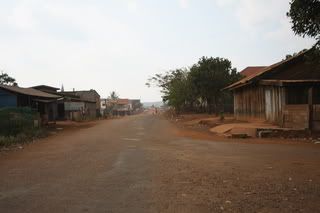
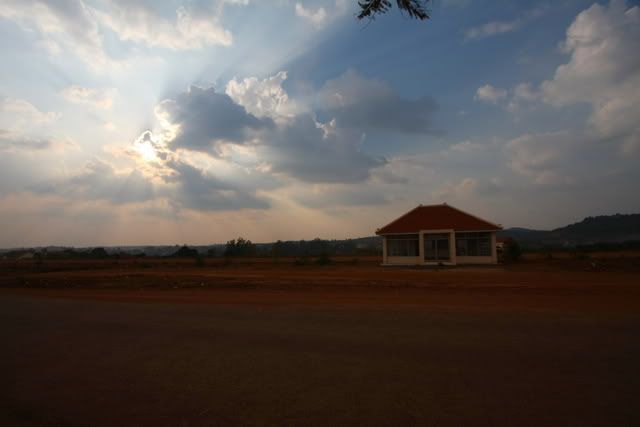
The tourist information office (above) - situated on the side of the "runway" wasn't buzzing either (i.e: closed). Luckily the plan I had in mind did not focus upon urban life. Rather the plan was to get on an elephant and trek through the jungle....
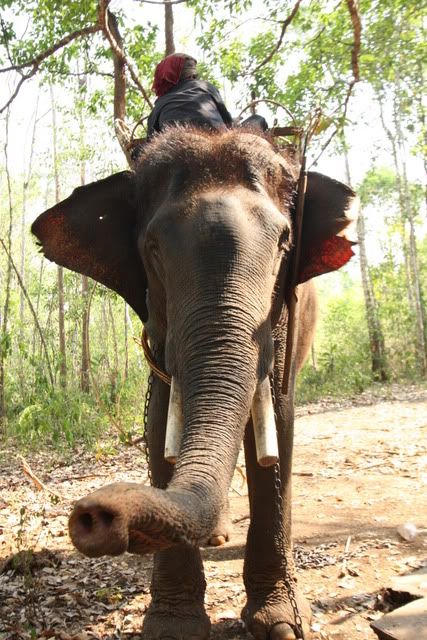
Elephants in Cambodia are supposed to be subject to rules regarding their working time. 4 hours a day, 5 days a week. Sounds like a good deal to me. Our elephant driver (known as a mahout) was a woman and she handled the elephant confidently and with ease.
Our mahout was not Khmer but part of an ethnic group known as Phnong. In fact 80 percent of the Mondulkiri's population is made up of tribal minorities. Phnong are the most common ethnic group in the province and are animists rather than Buddhists. A quick google search of Phnong will reveal an interesting story about Cambodia's jungle child. A Phnong child who went missing in the jungle only to supposedly return many years later as a feral child. http://onwardoverland.com/articles/junglegirl.html
The Phnong make their living from the land. In fact they grow rice and coffee on spots of land that have been reclaimed from the jungle by slash and burn agricultural techniques. The Phnong practice of slash and burn is, as you might imagine, fairly labour intensive. The Phnong use one site for up to five years before moving to a new location.
The Phnong experience a number of months of the year where the food they have grown runs out. During this time (up to say, 5 months) they forage in the jungle for food and fish. A current problem relating to land grabbing is that large amounts of land have been logged, sold or otherwise removed from the ownership of the Phnong community. Clearly if they gave no land then their traditional values will start to be eroded as they will not have access to the resources which sustain them.
My mahout guided the elephant through the dense jungle, the cashew nut farm (elephant's favourite it seems given the amount he was eating) and small rivers to reach my destination. An isolated waterfall and "picnic" spot.
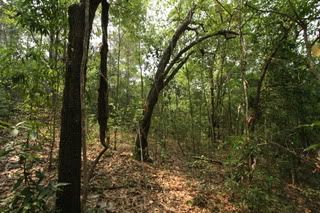
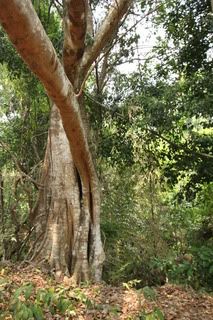
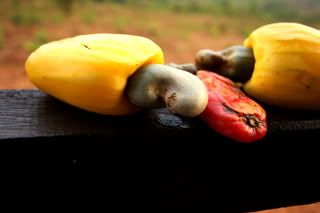
Cashew fruit - elephant treats and also a human Cambodian favourite too! Only eat the fruit (not the nut without it being treated), exceptionally juicy to touch but dry and powdery to taste - odd.

Arrival at a waterfall can only mean one thing in Cambodia - fully clothed swimming! I got straight in - only removing my shoes, much to the pleasure of the children of the mahout who had suddenly appeared seemingly from nowhere - they also jumped in.


Following the swim we shared the joy of Vaseline by the waterside and then.... because they loved that so much (they were taking massive dollops and coating themselves in it) I got out the sun cream....

Without prompt they were soon sloshing it all over themselves and asking for more and more!




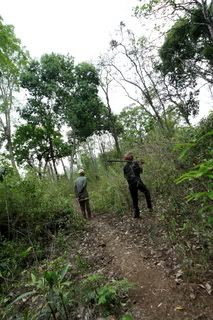

The mahout didn't speak any English and my Khmer was not up to scratch but after a lot of miming we ended up having a sleep in her traditional house - Only to be woken up about an hour later by the gentle ringing of a cow bell and a cow trying to get onto the house! (chased away).
During this time the elephant had been left to return to the jungle (in accordance with elephant laws) and we had to find it and catch it - all of a sudden there it was. Breaking trees and having a lazy. Once it was caught, basically the mahout walked up to it and got on it (simple!) it was taken for his bath...
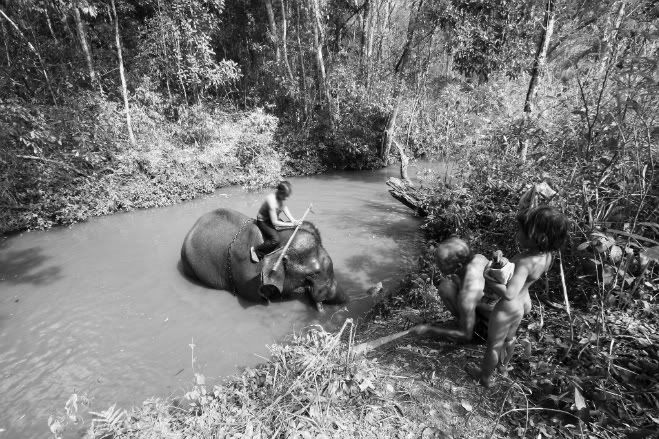


I wonder at what point do you realise that you have tamed a wild elephant enough to a) climb on it and b) give it a good scrub in the river? The elephant was loving clearly loving it - getting right under the water and so you could only see his trunk. Thankfully the Phnong are known for their excellent elephant handling abilities. They catch young elephants in the wild with ropes and then separate them from the herd - Not without risk! The elephant eventually becomes domesticated and then is used to carry heavy loads and help with logging (in fact a simple noise from the mahout on my journey prompted the elephant to clear any trees in its path with its trunk with exceptional ease - like we could snap a twig!).
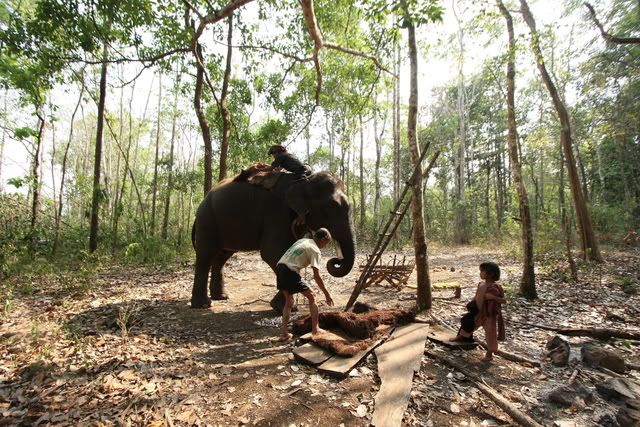

Once bathed the elephant had to be dressed again, first the matting to stop (I presume) the bamboo cage (for us to sit in) from rubbing the elephant and then the cage - kept on by another piece of bamboo!
Then a trek back through the jungle - The mahout also sat her child on the elephant's neck and the girl, who could not have been more than 7 year old, was clearly used to it and fearless! In fact in this photo she had fallen asleep! - I was seriously impressed by the "superwoman" mahout - Guide an elephant through a jungle using your feet as the steering wheels whilst holding your sleeping child....easy!
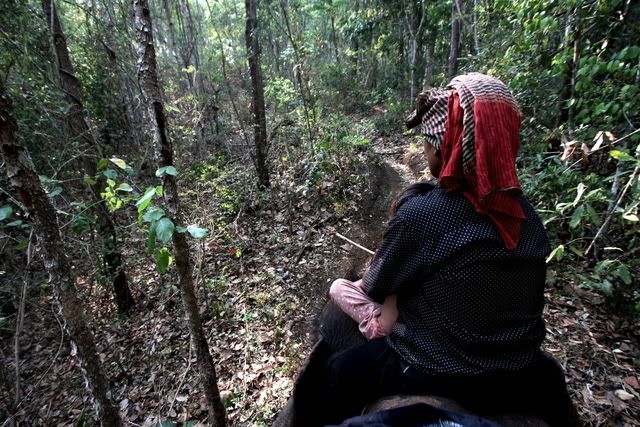
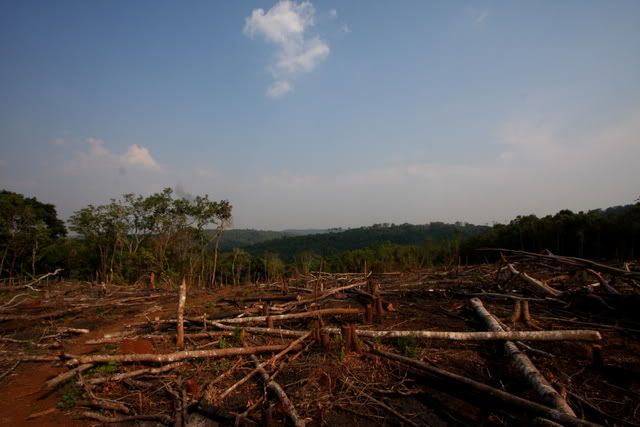
Towards the end of the journey, as we came towards the Phnong village, the Phnong slash and burn agricultural practice became prevalent.
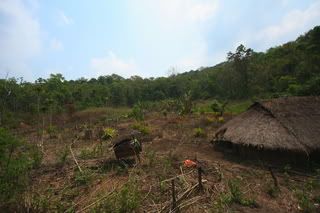
Finally returning to the village about 8 hours later feeling much sorer after being cramped in the little bamboo basket! The above house is a traditional Phnong house - 15 people live in here - inside there are basically two raised platforms on either side of the house so sleeping, cooking, eating - everything.
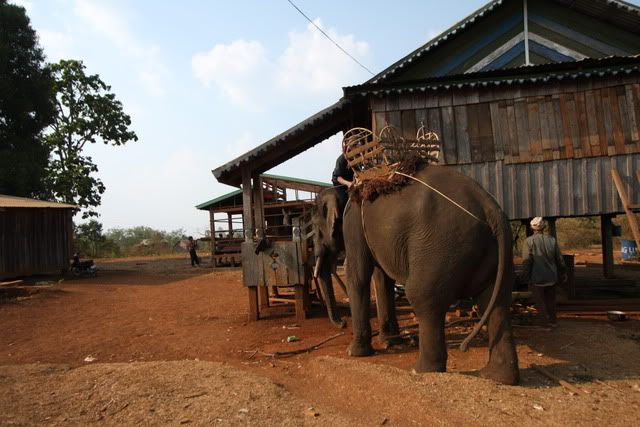
Final stop for the elephant....


Back in "civilisation" it was necessary to pay a visit to Bananas! - The guide book said this was the most happening place in town - If you are in the area drop in. Its run in the house of the proprietor who is a Dutch woman. Two British Bulldogs will greet you as you walk through the path in the garden to reach the house/restaurant and the solitary table by the tiny river. She3 had bo other guestsbut the food was some of the most delicious western food I have had in Cambodia.

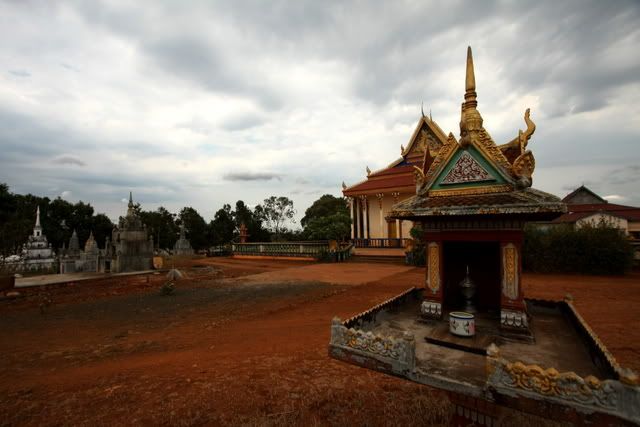
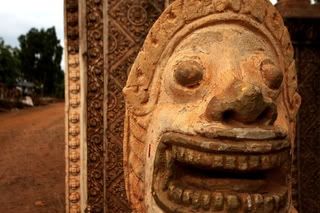
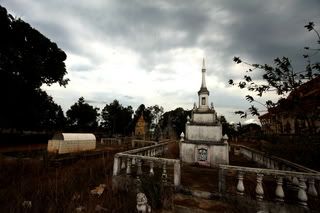
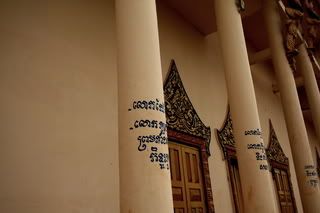
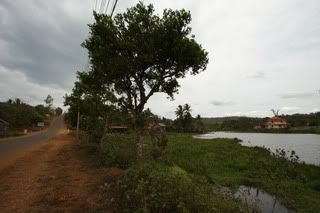
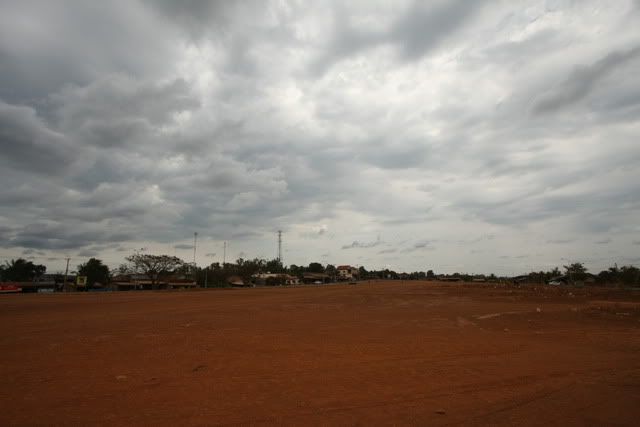

The runway
Mondulkiri is sometimes called the Switzerland of Cambodia - I struggled to see the comparison myself. The reason, I think, are the lakes which the town has. For the remainder of my time the weather became cold and very windy. This meant walking around exploring the local area on foot was a possibility - Lakes, temples and finally the runway - Yes, it has no tarmac. It’s just dust!
